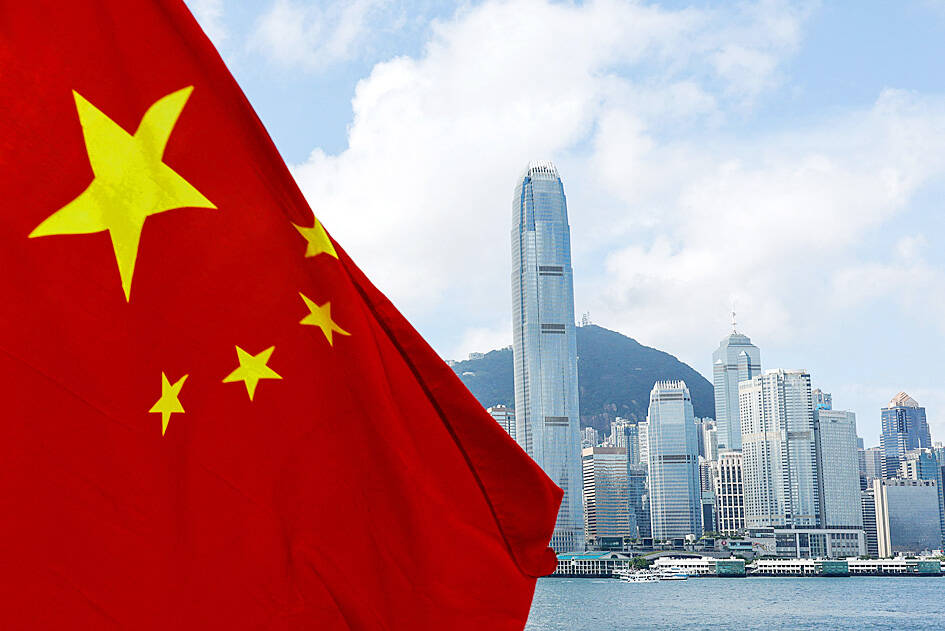China’s Office of the Commissioner of the Ministry of Foreign Affairs in Hong Kong has asked foreign consulates in Hong Kong to submit details of their local staff, which is more proof that the “one country, two systems” model no longer exists, a Taiwanese academic said.
The office sent letters dated Monday last week to consulates in the territory, giving them one month to submit the information it requires.
The move followed Beijing’s attempt to obtain floor plans for all properties used by foreign missions in Hong Kong last year, which raised concerns among diplomats that the information could be used for espionage or to install listening devices.

Photo: Reuters
The Hong Kong authorities said on the submission form that the information was being collected in accordance with the principle of proportionality and common international practices.
The personal data collected would be handed over to agents of the relevant bureaus, departments or agencies to manage local employees of the consulates, the note said.
The information required includes names, titles, dates of appointment, addresses, identification card or travel document numbers and nationalities of the employees.
The employees are also required to provide copies of their identification cards or travel documents.
The office on Wednesday last week said the request is in line with the Vienna Convention on Consular Relations and common international practice.
In Taipei, an official familiar with Hong Kong and Macau affairs said that it was “not surprising” that the foreign consulates would receive this kind of request from China, adding that it might be related to the widening of the Counter-Espionage Law in July.
The Taipei Economic and Cultural Office in Hong Kong of Taiwan’s Mainland Affairs Council did not receive such a request as it is “special” to Beijing, the official said.
National Cheng Kung University political science professor Hung Chin-fu (洪敬富) said that amending the Counter-Espionage Law, the Foreign Relations Law and the Patriotic Education Law to expand the scope of their applications to Hong Kong and Macau, as well as requesting information from foreign consulates showed that Beijing is suspecting Hong Kongers of working for hostile foreign forces.
Hong Kongers are perceived as actors who could threaten China’s interests or subvert the Chinese government, Hung said.
The move might have a chilling effect and make it more difficult for the West to have normal interaction with China, Hung added.
The vague definition of spies in the Counter-Espionage Law leaves those working in foreign consulates open to being charged falsely, he said.
Hong Kong citizens have no autonomy as they have to comply with Chinese laws under the so-called “one country, two systems” model, adopting the “New Era” ideology of Chinese President Xi Jinping (習近平), he said.
“The non-existence of the ‘one country, two systems’ model has been proven once again,” he said.

Alain Robert, known as the "French Spider-Man," praised Alex Honnold as exceptionally well-prepared after the US climber completed a free solo ascent of Taipei 101 yesterday. Robert said Honnold's ascent of the 508m-tall skyscraper in just more than one-and-a-half hours without using safety ropes or equipment was a remarkable achievement. "This is my life," he said in an interview conducted in French, adding that he liked the feeling of being "on the edge of danger." The 63-year-old Frenchman climbed Taipei 101 using ropes in December 2004, taking about four hours to reach the top. On a one-to-10 scale of difficulty, Robert said Taipei 101

Nipah virus infection is to be officially listed as a category 5 notifiable infectious disease in Taiwan in March, while clinical treatment guidelines are being formulated, the Centers for Disease Control (CDC) said yesterday. With Nipah infections being reported in other countries and considering its relatively high fatality rate, the centers on Jan. 16 announced that it would be listed as a notifiable infectious disease to bolster the nation’s systematic early warning system and increase public awareness, the CDC said. Bangladesh reported four fatal cases last year in separate districts, with three linked to raw date palm sap consumption, CDC Epidemic Intelligence

Taiwanese and US defense groups are collaborating to introduce deployable, semi-autonomous manufacturing systems for drones and components in a boost to the nation’s supply chain resilience. Taiwan’s G-Tech Optroelectronics Corp subsidiary GTOC and the US’ Aerkomm Inc on Friday announced an agreement with fellow US-based Firestorm Lab to adopt the latter’s xCell, a technology featuring 3D printers fitted in 6.1m container units. The systems enable aerial platforms and parts to be produced in high volumes from dispersed nodes capable of rapid redeployment, to minimize the risk of enemy strikes and to meet field requirements, they said. Firestorm chief technology officer Ian Muceus said

MORE FALL: An investigation into one of Xi’s key cronies, part of a broader ‘anti-corruption’ drive, indicates that he might have a deep distrust in the military, an expert said China’s latest military purge underscores systemic risks in its shift from collective leadership to sole rule under Chinese President Xi Jinping (習近平), and could disrupt its chain of command and military capabilities, a national security official said yesterday. If decisionmaking within the Chinese Communist Party has become “irrational” under one-man rule, the Taiwan Strait and the regional situation must be approached with extreme caution, given unforeseen risks, they added. The anonymous official made the remarks as China’s Central Military Commission Vice Chairman Zhang Youxia (張又俠) and Joint Staff Department Chief of Staff Liu Zhenli (劉振立) were reportedly being investigated for suspected “serious